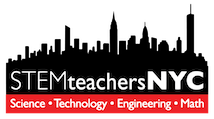Leader: Mark Schober
Mr. Schober will share a sequence of demos and student activities that induce students to develop a particle model of matter to help them understand meteorological concepts, including wind, air pressure, humidity, and phase changes. This knowledge provides a solid foundation for chemistry and physical science and all subsequent science courses. Participants will receive a free kit of materials to conduct these demos and activities in their own classrooms, including weighing air, diffusing odor, compressing air, picking up tables with air, and heating and cooling air and water. Bring a tote bag to take the materials home with you! During the workshop, participants will run the demos and activities themselves and work through the accompanying materials in “student-mode” and then discuss the deeper pedagogical issues with colleagues in “teacher-mode.”
“If, in some cataclysm, all of scientific knowledge were to be destroyed, and only one sentence passed on to the next generations of creatures, what statement would contain the most information in the fewest words? I believe it is the atomic hypothesis (or the atomic fact, or whatever you wish to call it) that all things are made of atoms—little particles that move around in perpetual motion, attracting each other when they are a little distance apart, but repelling upon being squeezed into one another. In that one sentence, you will see, there is an enormous amount of information about the world, if just a little imagination and thinking are applied… ” — Richard Feynman

